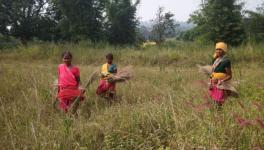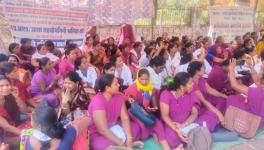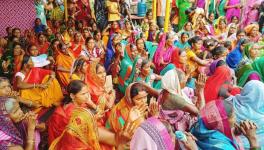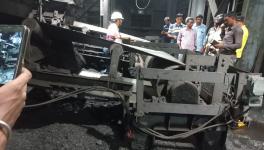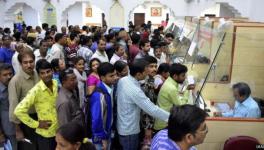Coal Scavengers in Dhanbad Lose Lives, Livelihood in Pandemic
Asgar Alam and Jena Mahato in Jharia, Jharkhand.
Trudging along with their bicycles each loaded with sacks of coal weighing around 50 kg, two men emerge out of a blanket of intense fumes. “Coal is our undeniable fate and Covid is the new threat to our daily earnings,” say Asgar Alam and Jena Mahato hinting at the challenges faced by the coal scavengers in the nation’s most dangerous coalfield. Both men, who hail from Bagdigi village of Jharia, Jharkhand, are the closest among those settled near the burning coal residues and fuming land.
Alam and Mahato’s daily routine consists of leaving for Kuniya coal mine for four hours before sunrise and again in the evening and returning with coal sacks weighing around 50 kg tied to their bicycles. While segregating the required coal pieces and selling them at the local market, which fetches Rs 200, they have to undergo the “intimidating experience of with Central Industrial Security Force personnel”, says Alam.
The outbreak of COVID-19 was a double whammy for the coal scavengers. Besides claiming several lives, the pandemic ravaged their livelihood. Despite the coal mines operating amid the lockdown, stringent movement restrictions completely disrupted their routine. Mahato was among the several scavengers who dared to go out and had to bear the wrath of the police, who had barricaded the villages.
As per Section 2(xii) of the Essential Services Maintenance Act (ESMA), 1981, any service in any establishment or undertaking dealing with the production, supply or distribution of coal, power, steel or fertilisers” is considered as an essential service. However, the suspension of allied activities, like coal picking, during the pandemic disrupted the supply chain to the local market, restaurants and households.
Anand Majhi in Mugma, Dhanbad.
A Harvard research estimates that around 10-15 million people are dependent on the coal belt. Anand Majhi, who starts work at dawn and wraps up by 11 am, resides near Mugma’s Kapasara opencast mine in Dhanbad district. The pandemic snatched his only source of daily income from scavenging of coal and its sale to local eateries, brickkilns and small traders, which sustained his family of five. “All five of us slipped into two months (May-June) of penniless life,” he says.
Majhi skipped the COVOD-19 jabs as he could not afford to lose even a day’s income due to the fever and body ache caused by vaccination. Kapasara, home to a large coal scavenging population, has become vulnerable to the virus due to the unavailability of vaccines. As per locals, the availability of vaccines is supposed to be notified by the panchayat officials but the sarpanch has been dragging his feet on it. Only those close to sarpanch are notified, they allege.
Sunita in Jharia.
Sunita collects coal at Rajapur opencast mine every afternoon with each basketful containing up to 5 kg of burned coal. Several such basketfuls fill up a sack that weighs around 40-50 kg. One male member of her family transports the sacks on his bicycle to the village. Sunita has to cough up Rs 10 per sack to the security officials to avoid manhandling.
Vinod Yadav in Dhanbad.
They villagers pick coal in adverse conditions—on top of opencast mines amid toxic gases that are released after the burning of coal. Vinod Yadav, a Dhanbad-based coal scavenger ferries a quintal of coal daily and sells it to local eateries near the Dhanbad railway station. He covers almost 7 km daily with the sacks, each fetching only Rs 60, on his bicycle. Along with his brother, Yadav had been scavenging coal for more than 12 years. Unfortunately, the pandemic killed his brother, who was a patient of tuberculosis.
Jharkhand has the highest coal reserves (about 32% of India), second highest iron ore reserves (25.07%), third highest copper ore reserves (18.48%), seventh highest bauxite reserves and is the sole producer of prime coking coal. However, the rich mineral resources have not translated into the development of the state. According to the Jharkhand government, the state has 39.1% people below the poverty line as against the national rate of 29.8%.
Shibalak Paswan, Lodhna unit president, Bharat Colliery Kamgar Union, informed Newsclick that coal picking in Dhanbad is the means for survival. In 2000, Bharat Coking Coal Limited (BCCL) started opencast mining by digging open pits or tunnels, which were not refilled and became a tempting place for locals to pick the leftover coal. Several villagers were killed while collecting coal. The number of casualties remains unknown as the families do not report the deaths fearing police harassment and BCCL action for illegally ferrying coal. “Feeding themselves while dealing with grief is the fate of scavengers,” says Paswan.
Many scavengers were reported to be dead during the first outbreak in Jharia region with the daily exposure to harmful gases making them most vulnerable to the disease. Since the pandemic outbreak, the Jharia hospital is home to a large number of patients complaining of asthma and TB.
Get the latest reports & analysis with people's perspective on Protests, movements & deep analytical videos, discussions of the current affairs in your Telegram app. Subscribe to NewsClick's Telegram channel & get Real-Time updates on stories, as they get published on our website.









